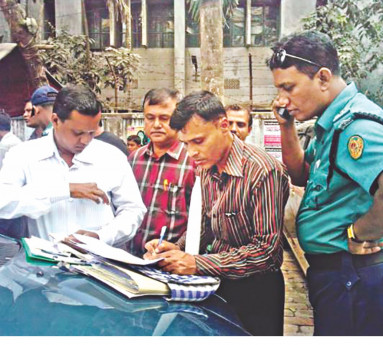JUDGMENT REVIEW
Law and Our Rights, The Daily Star, Law and Our Rights, 25 July 2017
Link: https://www.thedailystar.net/law-our-rights/the-existential-threat-executive-run-magistrate-courts-1438096
For many of us, including me, the Mobile Court Act 2009 remained a stillborn legislation since its inception on the face of a rebellious Rokon-Ud-Doula in 2007. Presumably, the lawyers and judges alike took it as a strategic and temporal concession on the part of the judiciary and a face-saving-condolence for the BCS (Admin) that was otherwise adamant not to see the whole administration of criminal justice passing out of its hold overnight. While the lawyers' and judges' long run struggle for implementing Masder Hossain verdict found its way-through in November 2007, constitutionality of the executive run mobile courts was to be tested sooner or later. And now, after around 10 years of the reluctant concessions, the chickens come home to roost. Kamruzzaman Khan v Bangladesh (W/P No. 8437/2011) along with some other writs of similar nature challenged several convictions and fines imposed upon the litigants by mobile courts run by executive officials on different occasions.
The petitioners challenged their trials and convictions with foundational and section-wise challenges to the 2009 law. Petitioners labeled the law as colourable one (p. 4 of the full text judgment). The court also found it running counter to the mandates of Article 22 of the constitution and Masder Hossain ratio though it pretended to pursue those (p 26). Article 22 and Masder Hossain verdict combined left no scope whatsoever for the executive magistrates to exercise judicial powers and discharge judicial functions (p. 44). With Article 35 of the constitution guaranteeing an “independent and impartial court or tribunal established by law” for us, 2009 Act permitted the executive magistrates to be the investigator, prosecutor, witness and judge all in a single proceeding (p 43). Interestingly, section 13 of the Act towered the authority executive magistrates even higher. It allowed the District Magistrate or Additional District Magistrate to be the appellate authority of any mobile court trial conducted by their colleagues in the administration. The court, therefore, adjudged the sections 5, 11 and 13 of the Act contemplating executive run mobile courts and appellate courts as contradictory to Articles 22, 27, 31 and 35(3) of the Constitution (pp. 55-56).
The Mobile Court Act dug a bottomless well of unfettered powers, unrestricted discretions, unguided sentencing options and unreasonable modes of handling trials. Firstly, section 6(2) of the Act conferred jurisdiction on the magistrates over a charter of offences to be endlessly expanded under rule making power of the government. The court found it contravening a settled proposition of law that no offence can be created and punished under any delegated or subordinate or subsidiary legislation (p. 52). Moreover, the breadth of the rule making so delegated was “really astounding” as parliament delegated (section 15) its plenary power of amendment in the schedule (an integral part of the law) in favour of the government (p. 56).
Secondly, section 6(4) left a blank check in the executive's desk to determine which offences would be “grievous in nature” to be tried by regular courts and which others are not. In a flagrant disregard of Article 27 of the Constitution, the magistrates would just pick and choose at their sweet will as to whom to prosecute then and there and whom to commit to the regular courts for trial (p 53). Likewise, sections 8 and 9 of the Act would permit the magistrates to inflict discriminatory sentences and execute them in a grossly unreasonable way (p. 54-55).
Thirdly, while the power to impose punishment by the Mobile Court is made subject to a “voluntary confession” of guilt by the accused, section 7 does not provide any clue as to how to obtain and record the “voluntary confession.” In absence of any section-164-like mechanism for obtaining confession, undue pressure and coercion were most likely to reign the ring (p. 53).
Towards the end of the judgment, however, the petitioner and the court conceded that while mobile courts symbolising the “justice on wheels” (p 46) are not unknown in our neighboring South Asian jurisdictions, permitting the executive run kangaroo courts under the guise would be 'de hors' the Constitution (p. 56). Advocate A F Hasan Arif unsuccessfully tried to convince the court that with Article 116A of the Constitution safeguarding the presiding magistrates' functional independence (p. 22), courts run by them may not be readily labeled as kangaroo courts. The Court stroke down the submission by holding that Article 116A has lost all its relevance with effect from 1st November, 2007 (p. 61). By holding this the court was best possibly pointing to the existential threats the “magistrates exercising judicial functions” are facing after the Masder Hossain verdict. Scope of the executive magistrates' exercising judicial functions being barred, the Court calls for mobile courts, if there be any, manned by the members of the Bangladesh Judicial Service only (p. 63).
As a matter of practicality, the court was ready to acknowledge the government's duty to maintain law and order and to prevent commission of offences. Yet as a matter of principle, it was not ready to abdicate the judicial power of cognizance and trial in favour of the government officials (p. 45). Unfortunately that was what the executive branch was asking for and the grandeur of magistracy being the bone of contention, the Mobile Court Act 2009 was bound to be nullified in due course of time. As I recollect from my recent conversation with an honorable judge of the High Court Division, mobile courts will not perish but the kangaroo courts will.
The writer is an Assistant Professor, Department of Law, University of Chittagong.




No comments:
Post a Comment